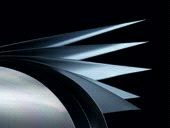CTP - Computer to Plate
Fujifilm PRO-T stability provides the key ingredient for Colourscript

Monday 23. June 2008 - East London print company, Colourscript, has become the latest convert to Fujifilms Brillia HD PRO-T processless plate. The installation was handled by Fujifilm distributor Service Offset Supplies (SOS) who also installed a Screen PlateRite CTP system, with Trueflow SE workflow, to run the plates.
Steve Williams, managing director of Colourscript, says: “The main drive to switch to processless was our commitment to achieving our environmental goals. We had a good look at what was available on the market, thouroughly researching three alternative solutions. Fujifilm and Screen came out on top as the PlateRite system is fast becoming the preferred platesetter on the market and PRO-T is the most stable and reliable processless plate available. Another key factor in favour of the Fuji plate is that it requires no gumming unit as some alternative products do.
“Environmental issues are critical to Colourscript. We have recently been accredited with ISO14001 and are constantly looking for ways to reduce our carbon footprint. Installing a processless system was a key ingredient and we are constantly reviewing our suppliers and energy consumption to look for ways to improve further still. Currently, we are in the process of moving towards FSC accreditation.”
Founded in 2007 following the merger of two companies, Colourscript runs both Heidelberg B1 litho and also Oce CPS900 digital presses. Customers include corporate, financial, publishers, design agencies and print management companies.
Compatible with most thermal (830nm) platesetters and approved for 1 percent – 99 percent at 200lpi conventional, 300lpi hybrid and FM screening, Brillia HD PRO-T is a non-ablative plate that carries a latent image with distinct contrast allowing visual inspection after imaging. Brillia HD PRO-T only needs an imaging power very close to Fujis existing, market leading, thermal processed plate at 120mJ/cm2, resulting in the same production speeds as conventional thermal CTP plates. Supporting run lengths up to 100,000 impressions, it will comfortably meet the demands of most commercial printers, and can be handled under daylight conditions.
